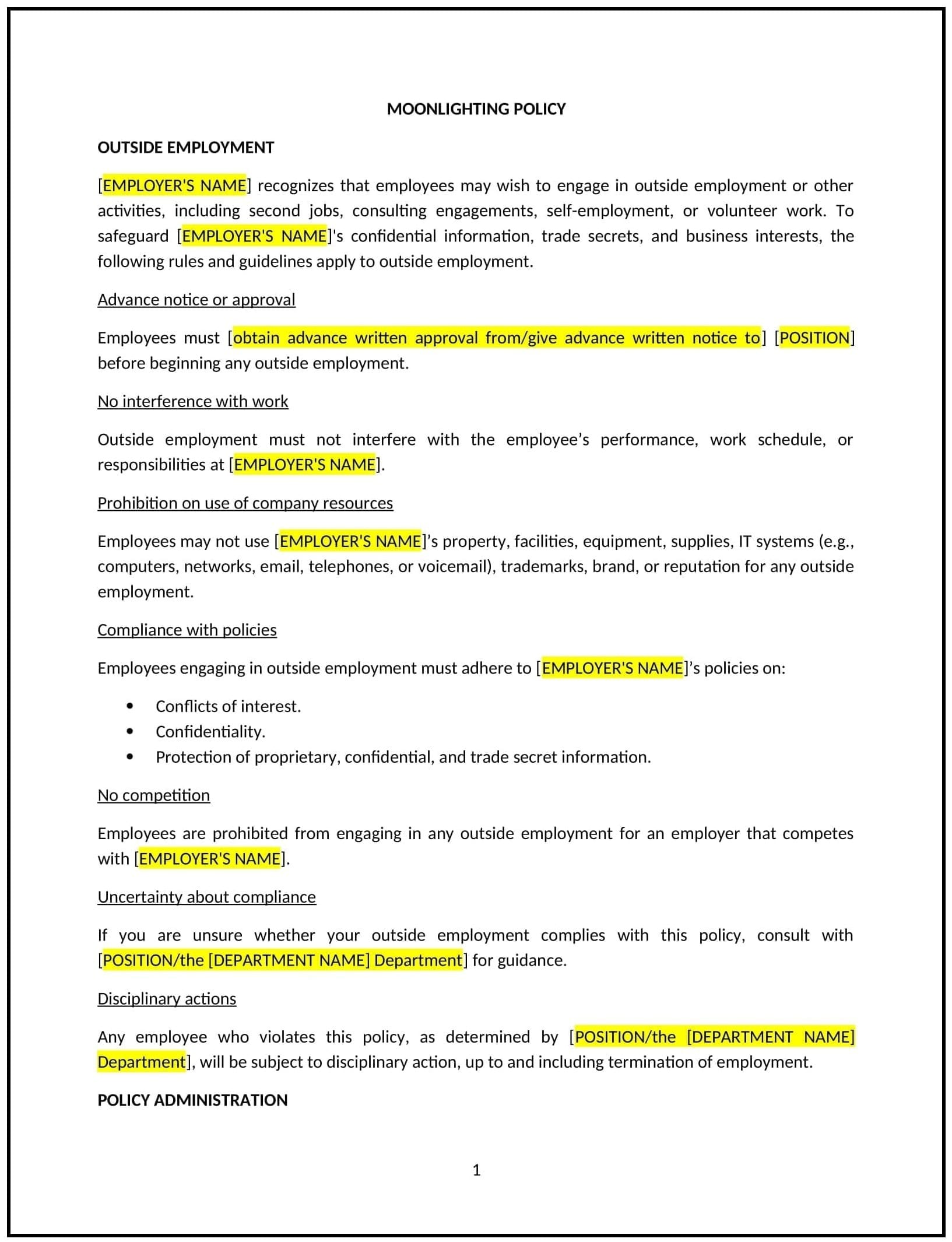Got contracts to review? While you're here for policies, let Cobrief make contract review effortless—start your free review now.

Customize this template for free
Moonlighting policy (Texas)
This moonlighting policy is designed to help Texas businesses establish clear guidelines for employees engaging in secondary employment or freelance work (moonlighting) outside of their primary role with the company. The policy outlines the company’s expectations regarding outside employment, including conflicts of interest, confidentiality, and productivity.
By adopting this policy, businesses can protect their interests, ensure that secondary jobs do not interfere with primary job performance, and promote transparency between the employer and employee.
How to use this moonlighting policy (Texas)
- Define moonlighting: Clearly explain what constitutes moonlighting, including secondary jobs, freelance work, consulting, and self-employment. Specify what activities are considered outside employment.
- Address conflict of interest: Ensure that employees understand that outside employment should not conflict with their primary job responsibilities or create a conflict of interest with the company’s business objectives. Employees should disclose any outside jobs that could potentially create conflicts.
- Set performance expectations: Specify that employees’ primary duties and job performance should not be affected by moonlighting. Make it clear that employees must meet their responsibilities and productivity expectations in their primary role.
- Maintain confidentiality and security: Emphasize that employees must not use company resources, time, or confidential information in their secondary employment. Employees should respect non-compete clauses or other agreements related to intellectual property and trade secrets.
- Establish disclosure requirements: Require employees to disclose any outside employment that may pose a conflict of interest or affect their work performance. The policy should outline the process for disclosing secondary jobs, including how often disclosures should occur and to whom.
- Specify consequences: Clearly state the potential consequences for employees who violate the moonlighting policy, including disciplinary action or termination, if their secondary employment negatively impacts their performance, breaches confidentiality, or violates other company policies.
Benefits of using this moonlighting policy (Texas)
This policy offers several benefits for Texas businesses:
- Protects company interests: By setting guidelines for outside employment, businesses can ensure that employees’ secondary jobs do not negatively impact the company’s interests, intellectual property, or confidential information.
- Ensures productivity: The policy ensures that employees are focused and productive in their primary roles and that moonlighting does not interfere with job performance.
- Reduces conflicts of interest: Clear guidelines on moonlighting help avoid potential conflicts of interest, protecting the company from situations where outside work might compete with its own interests.
- Promotes transparency: Requiring employees to disclose outside employment promotes honesty and transparency, ensuring that both the employer and employee have a clear understanding of any secondary employment.
- Maintains fairness: The policy ensures that employees are treated equally and fairly regarding outside employment, preventing situations where one employee’s moonlighting negatively impacts others or the company as a whole.
Tips for using this moonlighting policy (Texas)
- Communicate the policy clearly: Ensure that all employees understand the moonlighting policy and the company’s expectations regarding outside employment. This can be communicated during onboarding or through the employee handbook.
- Require regular disclosures: Set clear expectations for employees to disclose any secondary employment on an ongoing basis, especially when their outside job changes or when a conflict of interest arises.
- Monitor performance: Regularly evaluate employees' performance and ensure that their secondary employment does not affect their primary role. This can include regular check-ins or performance reviews.
- Address concerns promptly: If an employee’s outside employment is impacting their performance or violating the policy, address the situation quickly and directly.
- Review regularly: Periodically review and update the policy to reflect changes in Texas state laws, company practices, or industry standards regarding moonlighting.